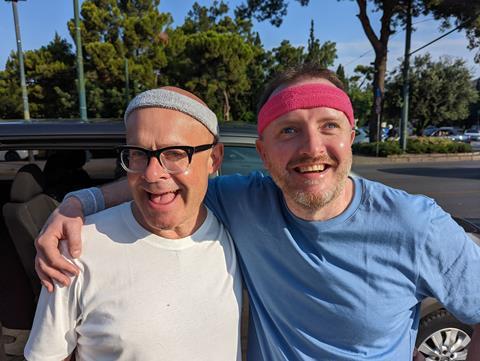“This was a celebration of grumpy old men-style friendship between two lovably cranky comedians”

Wonders of the World I Can’t See, Channel 4
“At its best, Wonders of the World I Can’t See reveals a more thoughtful sort of holiday, if you can call turning a lump of clay into a small penis more thoughtful. As Chris McCausland can’t see the big tourist attractions, it forces Harry Hill and the programme-makers to come up with a different sort of trip, one that’s busier and more active, but that still feels specific to each place.”
Rebecca Nicholson, The Guardian
“The programme took McCausland’s blindness as a starting point, but it was never the true subject. At its heart, it was a tribute to his ability to be hilariously curmudgeonly regardless of the surroundings: it was that super-dry humour that set it apart from other travel docs. This was a celebration of grumpy old men-style friendship between two lovably cranky comedians.”
Ed Power, The i
“I have seen travel documentaries hosted by a blind person before but never one played entirely for laughs. Nothing much happened in The Wonders of the World I Can’t See in which the blind comedian Chris McCausland and Harry Hill went to Athens to ‘see’ the Acropolis. But it worked because both of them are funny.”
Carol Midgley, The Times
“Unlike An Idiot Abroad, or Richard Ayoade’s Travel Man (another show of the same type), The Wonders of the World I Can’t See isn’t very funny. McCausland and Hill are both funny in other things, but here they seemed awkward – unsure whether to play this as a standard comedy travelogue or to take it a bit more seriously. McCausland also seemed in awe of Hill’s more established profile.”
Anita Singh, The Telegraph
“They had a go at athletics in the original Olympic stadium, and made pots, but constantly fell back on puerile jokes just for something to say. By the end of the trip the two men were obviously fed up of each other.”
Christopher Stevens, Daily Mail
Crashed: $800m Festival Fail, BBC3
“Although it has managed to secure what seems like fairly damning evidence of the company’s rumoured mismanagement (at best), Crashed lacks any confrontation with the brothers or anyone else in a leadership role in the company, which leaves the viewer slightly underwhelmed and unsatisfied.”
Lucy Mangan, The Guardian
“The testimony from former team members and people who regretted doing business with Pollen was somewhat illuminating, and we did get a sense of how the company was run. But what this story really required was a closer look at the Negus-Fancey brothers, and contributions from the investors who backed them.”
Anita Singh, The Telegraph
Litvinenko, ITV1
“In the main it tells the story well. The only problem is that for a TV drama the main draw — Tennant with a shaved head deteriorating before our eyes — exits in the first episode (I don’t think we needed a spoiler alert there, did we?). Then we are left with a slightly sluggish police investigation, which though fascinating, is less dramatic, more methodical procedural. It’s definitely worth watching, if only for Litvinenko’s moving posthumous speech, read by a friend outside the hospital.”
Carol Midgley, The Times
“The need to set out the facts of a complex assassination, as well as filling in the political background and sketching the rivalries between police departments, meant a great deal of explaining went on between characters. The story was at its most powerful when it concentrated purely on the drama of a man who was about to die and knew nothing could save him.”
Christopher Stevens, Daily Mail
































No comments yet